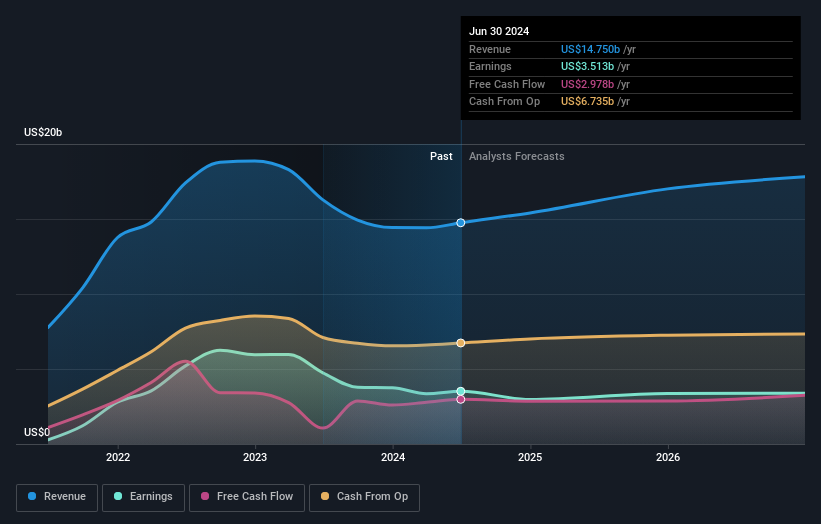Key Insights
- Significantly high institutional ownership implies Devon Energy’s stock price is sensitive to their trading actions
- The top 25 shareholders own 47% of the company
- Using data from analyst forecasts alongside ownership research, one can better assess the future performance of a company
A look at the shareholders of Devon Energy Corporation (NYSE:DVN) can tell us which group is most powerful. And the group that holds the biggest piece of the pie are institutions with 70% ownership. That is, the group stands to benefit the most if the stock rises (or lose the most if there is a downturn).
And institutional investors endured the highest losses after the company’s share price fell by 6.5% last week. Needless to say, the recent loss which further adds to the one-year loss to shareholders of 12% might not go down well especially with this category of shareholders. Also referred to as “smart money”, institutions have a lot of sway over how a stock’s price moves. As a result, if the decline continues, institutional investors may be pressured to sell Devon Energy which might hurt individual investors.
In the chart below, we zoom in on the different ownership groups of Devon Energy.
Check out our latest analysis for Devon Energy

What Does The Institutional Ownership Tell Us About Devon Energy?
Institutional investors commonly compare their own returns to the returns of a commonly followed index. So they generally do consider buying larger companies that are included in the relevant benchmark index.
Devon Energy already has institutions on the share registry. Indeed, they own a respectable stake in the company. This implies the analysts working for those institutions have looked at the stock and they like it. But just like anyone else, they could be wrong. If multiple institutions change their view on a stock at the same time, you could see the share price drop fast. It’s therefore worth looking at Devon Energy’s earnings history below. Of course, the future is what really matters.

Since institutional investors own more than half the issued stock, the board will likely have to pay attention to their preferences. Hedge funds don’t have many shares in Devon Energy. Our data shows that The Vanguard Group, Inc. is the largest shareholder with 12% of shares outstanding. For context, the second largest shareholder holds about 7.4% of the shares outstanding, followed by an ownership of 6.3% by the third-largest shareholder.
Our studies suggest that the top 25 shareholders collectively control less than half of the company’s shares, meaning that the company’s shares are widely disseminated and there is no dominant shareholder.
Researching institutional ownership is a good way to gauge and filter a stock’s expected performance. The same can be achieved by studying analyst sentiments. There are plenty of analysts covering the stock, so it might be worth seeing what they are forecasting, too.
Insider Ownership Of Devon Energy
The definition of company insiders can be subjective and does vary between jurisdictions. Our data reflects individual insiders, capturing board members at the very least. Company management run the business, but the CEO will answer to the board, even if he or she is a member of it.
Insider ownership is positive when it signals leadership are thinking like the true owners of the company. However, high insider ownership can also give immense power to a small group within the company. This can be negative in some circumstances.
Our data suggests that insiders own under 1% of Devon Energy Corporation in their own names. Being so large, we would not expect insiders to own a large proportion of the stock. Collectively, they own US$178m of stock. In this sort of situation, it can be more interesting to see if those insiders have been buying or selling.
General Public Ownership
The general public, who are usually individual investors, hold a 29% stake in Devon Energy. While this size of ownership may not be enough to sway a policy decision in their favour, they can still make a collective impact on company policies.
Next Steps:
It’s always worth thinking about the different groups who own shares in a company. But to understand Devon Energy better, we need to consider many other factors. Like risks, for instance. Every company has them, and we’ve spotted 3 warning signs for Devon Energy (of which 1 doesn’t sit too well with us!) you should know about.
If you are like me, you may want to think about whether this company will grow or shrink. Luckily, you can check this free report showing analyst forecasts for its future.
NB: Figures in this article are calculated using data from the last twelve months, which refer to the 12-month period ending on the last date of the month the financial statement is dated. This may not be consistent with full year annual report figures.
New: Manage All Your Stock Portfolios in One Place
We’ve created the ultimate portfolio companion for stock investors, and it’s free.
• Connect an unlimited number of Portfolios and see your total in one currency
• Be alerted to new Warning Signs or Risks via email or mobile
• Track the Fair Value of your stocks
Have feedback on this article? Concerned about the content? Get in touch with us directly. Alternatively, email editorial-team (at) simplywallst.com.
This article by Simply Wall St is general in nature. We provide commentary based on historical data and analyst forecasts only using an unbiased methodology and our articles are not intended to be financial advice. It does not constitute a recommendation to buy or sell any stock, and does not take account of your objectives, or your financial situation. We aim to bring you long-term focused analysis driven by fundamental data. Note that our analysis may not factor in the latest price-sensitive company announcements or qualitative material. Simply Wall St has no position in any stocks mentioned.




